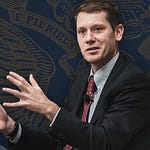Eliot and Eric welcome Francis Fukuyama, the Olivier Nomellini Senior Fellow at Stanford University's Freeman Spogli Institute for International Studies (FSI). One of America's most distinguished public intellectuals he is the author of several books including the End of History and the Last Man and, more recently, Liberalism and its Discontents. They discuss the impact of the war on Ukraine on the future of liberal democracy and the rules based international order, the drivers of populism and nationalism, the rise of illiberalism in both theory and practice, as well as the state of the academy and the situation in Georgia under the influence of Georgian oligarch Bidzina Ivanishvili.
https://www.ft.com/content/d0331b51-5d0e-4132-9f97-c3f41c7d75b3
https://www.theatlantic.com/ideas/archive/2022/10/francis-fukuyama-still-end-history/671761/
Shield of the Republic is a Bulwark podcast co-sponsored by the Miller Center of Public Affairs at the University of Virginia. Email us with your feedback at shieldoftherepublic@gmail.com
Learn more about your ad choices. Visit podcastchoices.com/adchoices












The Drivers of Illiberalism